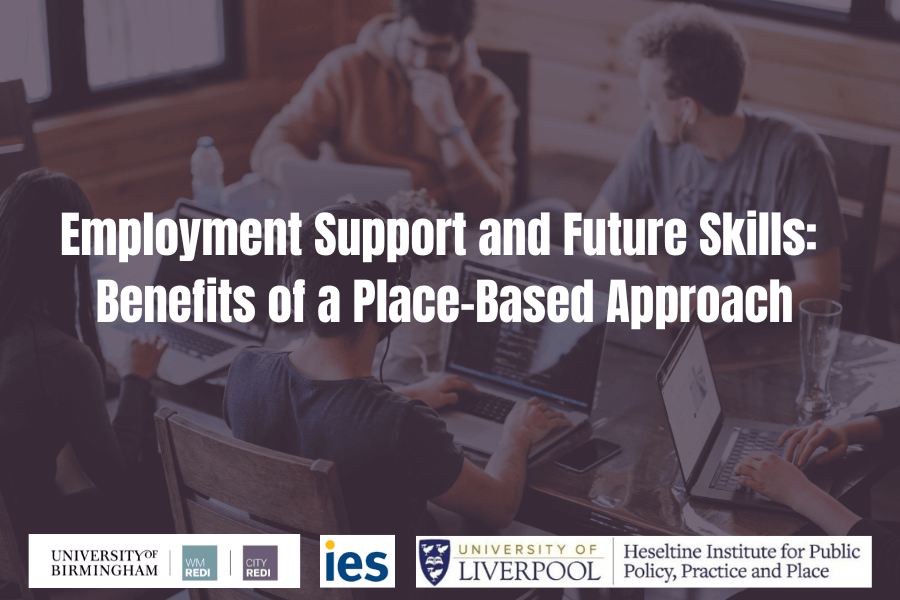
On Thursday 16th June, 11:00-15:15, the Heseltine Institute at the University of Liverpool and City-REDI/ WMREDI at the University of Birmingham are co-hosting an event in Liverpool on the theme of Employment Support and Future Skills: Benefits of a Place-Based Approach.
In the context of the government’s levelling up agenda and the opportunities and challenges presented by the launch of the UK Shared Prosperity Fund, it is crucial to reflect on the design of employment support and skills schemes delivered locally and its implications for future policy. The event will bring together over 50 representatives from central, regional and local government, academia and practitioner communities to consider the implications of two DWP-funded Innovative Employment Schemes for place-based policy and future programme design to equip adults with the skills and employment support they need to progress in life. Discussions will explore how best to:
- Measure success
- Sustain interventions
- Share learning between places
- Understand the challenges and opportunities of a place-based approach.
Anne Green, Professor of Regional Economic Development, City-REDI/WMREDI commented:
“A localised approach gave providers the flexibility to provide personalised support to address the needs of residents, including by leveraging the support of community providers. Through context-sensitive and tailored support many participants became more aware of employment opportunities and adopted more positive dispositions and behaviours towards work. However, it is important to note that the quantity, range and quality of jobs available vary across neighbourhoods.”
Sue Jarvis, Co-Director of Heseltine Institute for Public Policy, Practice and Place commented:
“Households into Work operated across multiple services and policy domains translating them into a single source of service delivery to improve employment outcomes. Placing the user at the centre of service design and delivery meant participants were better equipped to deal with issues like addiction, debt or low self-confidence, which if left unsupported were unlikely to be resolved. Continued investment in locally tailored solutions will be important for economic recovery post-pandemic and will contribute to the Government’s intentions to ‘level up’ underperforming and left behind parts of the UK.”
Sharing Learning from City-REDI and Heseltine Institute Evaluations
The event will open with presentations from Professor Anne Green and Dr Abigail Taylor (City-REDI/WMREDI) and Belinda Tyrell (Heseltine Institute) on the findings from two DWP-funded Innovative Employment Schemes – Connecting Communities (in the West Midlands) and Households into Work (Liverpool City Region) which provide a platform for learning.
Commissioned by the West Midlands Combined Authority (WMCA) as part of its devolution deal with the central government, the Connecting Communities pilot adopted an innovative, new, place-based approach to transitions into and within employment. It sought to address the challenges of local areas being ‘left behind’ by adopting a place-based focus on neighbourhoods with low employment rates and by supporting residents at different stages of their job-seeking journey. The Institute for Employment Studies (IES) and City-REDI have been involved in the evaluation of the pilot.
The £4.5 million Households into Work pilot involved an innovative collaboration between the Liverpool City Region Combined Authority, six Local Authorities and the Department for Work and Pensions. Launched in February 2018 and developed through the Liverpool City Region devolution deal with the central government, it aimed to address systemic issues associated with long-term and entrenched worklessness. Unlike more traditional employment support programmes, support focused on households with more than one adult unemployed and in receipt of benefits. The Heseltine Institute evaluated the pilot.
Panel Discussion
The opening presentations will be followed by a panel discussion chaired by Sue Jarvis where:
- Rob Tabb (Policy Lead: Employment and Skills, Liverpool City Region Combined Authority) and Fiona Aldridge (Head of Insight and Intelligence – Economic Delivery, Skills and Communities, West Midlands Combined Authority) will reflect on the benefits, challenges and priorities of a place-based approach for employment and skills.
- Thomas Pope, Deputy Chief Economist, Institute for Government will consider how public service reform can support a place-based approach.
- Andrew Phillips, Researcher, DEMOS will provide an overview of recent DEMOS research calling for universal employment support.
Delving Deeper into Place-based Policy and Practice
The afternoon session will feature:
- project insights from Conrad Parke (Birmingham Anchor Network) and John White (Liverpool City Region Combined Authority)
- and a central government overview from Urvashi Parashar (formerly Deputy Director, Evidence and Analysis, Levelling Up Taskforce, the Department for Levelling Up, Housing and Communities).
The event will conclude with table discussions where participants will consider how to measure success, sustain positive outcomes and implications for the design of future place-based policy to equip adults with the skills and employment support they need to progress in life.
Follow the discussion on Twitter using: #FutureSkillsSupport
Thursday 16th June, 11:00 -15.15
After the event, we will also publish a blog analysing key takeaways from the discussions for future policy design via Heseltine Institute and City-REDI/WMREDI platforms.
This blog was written by Abigail Taylor, Research Fellow, at City-REDI / WMREDI, University of Birmingham.
Disclaimer:
The views expressed in this analysis post are those of the authors and not necessarily those of City-REDI / WMREDI or the University of Birmingham.
